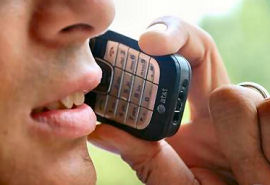An investigation into the purported health risks associated with electromagnetic fields has shown that media reports alone may cause suggestible people to develop symptoms of a disease.
Electromagnetic hypersensitivity has been the focus of previous studies, but scientists are still divided as to whether everyday electromagnetic fields (EMF) have any physiological effects. People who believe they are affected by electromagnetic signals (such as those emitted by cell phones) report physical symptoms that include headaches, dizziness, and burning or tingling sensations on their skin. In other studies using MRI scanning, it was demonstrated that the regions of the brain responsible for pain processing are active in such cases.
But a new study by researchers at Johannes Gutenberg University in Germany and King's College in London indicates that any effects may be all in the mind. "Electromagnetic hypersensitivity might actually be the result of a so-called nocebo effect," explained researcher Michael Witthöft. "The mere anticipation of possible injury may actually trigger pain or disorders. This is the opposite of the analgesic effects we know can be associated with exposure to placebos."
Witthöft undertook the study in collaboration with King's College's James Rubin during a research stay in London. For the study, 147 test subjects were divided into two groups. The first group was shown an actual BBC television report about the potential health hazards associated with cell phone and WiFi signals. The other group watched a report on the security of Internet and cell phone data. Then, all the subjects in both groups were "exposed" to sham WiFi signals that they were told were real.
Even though they were not exposed to any radiation, some of the subjects developed symptoms. Fifty-four percent of the subjects reported experiencing agitation and anxiety, loss of concentration or tingling in their fingers, arms, legs, and feet. Two participants left the study prematurely because their symptoms were so severe that they no longer wanted to be exposed to the "radiation." Witthöft said the symptoms were most severe among the subjects who had viewed the BBC documentary about the possible hazards of EMF radiation.
Witthöft contends that "sensationalized" media reports on potential risks can have a significant effect on the health of large sections of the population. "It is likely that over the long term some people begin to believe that they are sensitive and develop symptoms when exposed to electrosmog," he suggests. "Tests have shown that the people affected are unable to tell if they have really been exposed to an electromagnetic field. In fact, their symptoms are triggered in exactly the same way if they are exposed to genuine and sham fields."

No comments:
Post a Comment